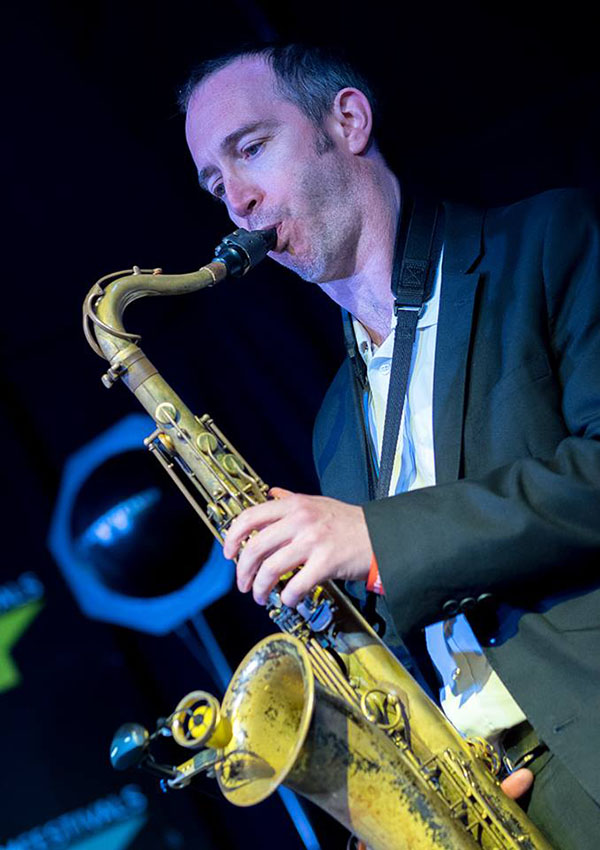
by Sean Wilkie
October 28, 2016
/ LIVE
Guest contributor Sean Wilkie enjoys the music of tenor saxophonist Jake McMurchie's quartet, and in particular the contribution of bassist Riaan Vosloo.
Jake McMurchie Quartet
Dempsey’s, Cardiff, 26 October 2016
Tenor-saxophonist McMurchie is probably best-known as half of the front-line of the Bristol-based quartet, Get The Blessing, last heard in Cardiff in 2015, playing at the Royal Welsh College of Music and Drama.
Since then, he has performed twice at Dempsey’s in bassist Greg Cordez’s quintet. But last night, Jake McMurchie was in charge, leading a quartet through two sets of approximately forty-five minutes length for a very small but appreciative audience, mostly comprised of the handful of regulars who can be found enjoying the music there every Tuesday and Wednesday.
Although liberally sharing time and space for soloing with his guitarist Dan Waldmann, the saxophonist lead the group from the front, arranging the other musicians across the back of the room and stepping aside when he was not himself playing. The quartet appeared in a casual dress-down aesthetic with bassist Riaan Vosloo, for want of an iron, marginally the scruffiest of the four.
The first set began with an intriguing original composition by the leader, “Life is Ours in Vain”, whose sinuous melody wove itself through a rhythm in a six-time which seemed to be built from a four and a two, thus utterly avoiding any waltz-feeling. It is both an attractive melody and a good basis for improvisation, its relatively long bars a challenging but fertile space for invention. On a night of music largely devoted to covering tunes composed by a handful of significant if left-field jazz giants, I was impressed if surprised that the saxophonist threw out such a fine composition of his own at the very beginning, before it was entirely clear that everybody was warmed-up, or operating in the same time-zone.
The first of the night’s five standards-slash-cover-versions was Thelonious Monk’s “I Mean You”, on which McMurchie demonstrated a sound grasp of the history of both his instrument and the quartets that Monk led from the mid-1950s onwards, with what sounded like nods towards Johnny Griffin and Charlie Rouse. Dan Waldman essayed one of his more focused solos of the night, utilising a springy-sounding effect which heightened the elasticity of the short and rugged lines produced from his Fender Telecaster. Riaan Vosloo, however, took home the Thelonious Monk Prize for the night by bringing his bass solo to a satisfying resolution two bars early and stopping there. If this was his first noticeable contribution, it wasn’t his last. Vosloo imparted a deep and woody-sounding authority to most of what was best about the night’s music: he kept things quite straightforward harmonically-speaking, but whether it was anchoring Sun Ra’s “Love In Outer Space” with a single repeated six-beat vamp, or rapidly firing-off strings of threes and twos in perfect time against the express-train eights cracking off Matt Brown’s cymbal during a roller-coaster version of “Lonely Woman” which closed the first set, the bassist casually essayed enormous technique, stamina and finger-strength for those who were watching closely and not distracted by the creases in his shirt or the stain on his un-ironed left trouser leg. Vosloo last played at Dempsey’s in July with the Kevin Figes Quartet; and whomsoever he next returns with, I shall endeavour to be there.
The second set began and ended with the saxophonist’s own compositions. “Aether Drift “is a piece he has recorded with his other group, Michelson Morley, and it produced from him a long and compelling solo which belied the title of the piece by going somewhere. On this, as on Steve Kuhn’s “The Saga of Harrison Crabfellow” during the first set, the leader showed an aptitude for developing ideas patiently and linking them into larger structures.
But McMurchie can burn as well: set-closer “And You Are” found him alternately piling up huge mouthfuls of notes, then springing forward in bounds, as if bidden to catch up with Matt Brown. Although dedicated to oud player Anouar Brahem, the joyfulness and tonalities in the piece brought to mind the South African exiles, and provided a satisfying climax to the evening.
In between these pieces, the leader introduced perhaps the most left-field of the left-field jazz composers featured on the night: Tom Waits, whose “Johnsburg, Illinois” was read tenderly but straight-up by McMurchie before being addressed lovingly by Vosloo. The Sun Ra space-waltz which followed it was both musically and thematically an appropriate counterbalance, and further if unnecessary evidence of Jake McMurchie’s ability to put things together.
Sean Wilkie
blog comments powered by Disqus